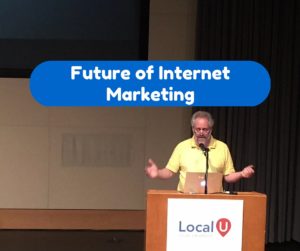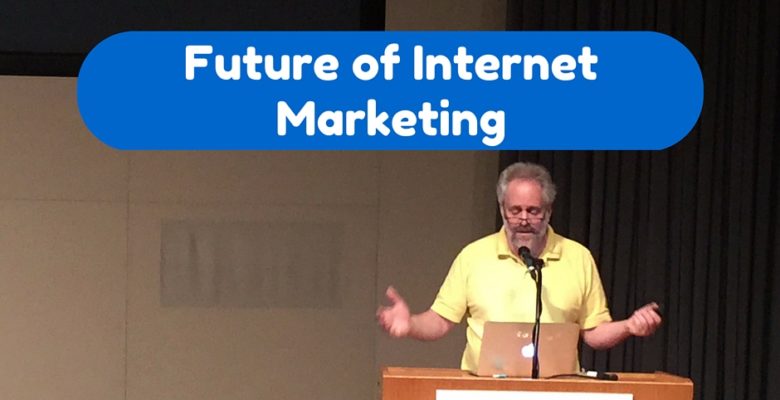The Future of Internet Marketing — An Interview with Mike Blumenthal
I had the opportunity to talk with Mike Blumenthal about the future of Internet marketing during a recent Local University event in Austin, TX. This was especially timely for me, because I did a presentation on the future of Internet marketing for the El Campo Rotary Club a few days later and we discussed the future of Internet marketing during a meeting of the Fort Bend Internet Marketing Group on November 16th.
Don’t invest in out-of-date Internet marketing strategies. Position your business for digital marketing success now and in the future. If you’re interested in visiting about how best to position your small business for future success online, please call us at 281-343-3284 or send us an email through our contact form.
Here’s a summary of Mike’s interview.
– [Paul] I’m Paul Sherland with IX Brand SEO Services Company, and I’m here in Austin, Texas with Mike Blumenthal of Local University. And I’m a Local U veteran. I’ve been to five Local Us and I’ve learned something new… many things new every time I’ve been here. I’m gonna be talking about the future of Internet marketing, and especially for small business, in the next three, four, five years. And there’ve been a lot of changes in search engine optimization, in social media, and in the way Google and the other search engines return search results. Also in artificial intelligence, the amount of data collected about consumers and customers, and Internet users. So I was wondering if you could just share some thoughts about what you’ve… –

[Mike] Let’s go back a little bit in history, if you don’t mind, right? So you know, Google started local in 2004-2005. It was basically as a variation of search, and so the first seven years of local search with Google was really about search engine optimization. You know, as Google evolved, they changed their internal architecture, they basically dominated, and decimated that marketplace. They basically put out, you know, in 2005 there were a lot of competitors, and today’s market for that sort of main chunk of the market where people are looking for local businesses, they’ve become the dominant player. And in that, they’ve made a transition sort of away from this search engine optimization towards a, for them, sort of inbound sales organization, where they’re looking to attract small businesses so they can upsell them on Adwords, or other products.
Although the practice is still useful, you’re seeing a transition in local, right now, of it not being so much a search opportunity as a platform for transactions, you know, like restaurant reservations or hotel bookings, Google is there, but there are other people there, too. So it’s a little difficult to know. Obviously, the future is always unpredictable, so my opinion is as good or as bad as the next person’s.
You know, there’s several big trends. You know, Google dominates local search as we know it today, but they basically confronted initially, you know, the yellow pages, the mapping companies, the other directories, the other search engines, and managed to basically win those battles on a multi-front basis. They’re now confronted with a different level of competition, right, with the form of Apple on cellphone, from Facebook and social, and the form of, you know, Paypal on payments, and Amazon on marketplaces, right? And each of those companies sort of views local in their unique way.
So if Amazon views local as a marketplace issue, right? And we’re seeing rumors of Amazon creating marketplaces for carpenters and plumbers in local markets, right? And managing that booking process. Apple views it through the lens of the personal computer, where the person opts-in to those services, right? Facebook views it through the social graph, and they need as much or more transparency and who you are, and what you do, and the color of your underwear than Google does, right? Google views… there’s no such thing as opt-in or opt-out with Google and Facebook, they just want all your data all the time, right?
So Google views it as a big data problem, where they’re trying to get the best answers for the most people. So each of them view it in their own way, and we don’t know. Obviously the future’s all we can see is these emerging trends, so predicting which of these paths is the most likely to, you know, win… We know that Google is a fierce competitor in these kinds of battles. We know that they will pull out all the stops if they see it as a critical issue, like they did against the yellow pages and various other entities they were up against, most of which are, you know, limping along now, or not standing at all, but it’s gonna be a different battle cause they’re up against much bigger resources, right? So depending on which of those dominates, right?
So if Apple dominates, where the person… Apple positions privacy as a selling point, whether it really is or not, who knows, but they position it as a selling point, you basically have to opt-in to some form of beacon communication, right? And the problem there for the small business are they gonna be able to participate with apps and have beacon-like sensing, in-store sensing, that kind of thing. So the problem there is gonna be who you’re gonna partner with to do that, cause it’s unlikely you’re gonna push your own app, right? Somebody like Nordstrom is gonna have their own app, but will the small business? So you have problems there with visibility. You know, if Amazon becomes the marketplace, right, you have other issues. You know, commodification of your services, more transparency about who you’re competing against, you know, in that sense.
You know, Google is Google, obviously. They know ads. They basically collate and collect information, and use it to sell ads. That’s their model. So where they go with local, you know, appears to me to be, like I said, more of a inbound marketing for them as a funnel into their Adwords world, and possibly into transactions. So I see it moving away from this sort of low hanging fruit of free, and towards things like what Facebook is doing with reduction of organic visibility, and if you want to increase your visibility you have to pay for it. I see more of that happening, which means it’s gonna become, you know, perhaps less technical to a level, sort of point asnd click, but perhaps more expensive. – Right.
[Paul] Do you know enough about net neutrality, the net neutrality issue, to comment about that?
[Mike] – You know, my view as a… and from where I sit on the political spectrum is that most of these discussions, like net neutrality, typically end up being in our society discussions between large groups of capital interests. In other words this basic discrepancy is a different business interest between one group and another, right? So while as individuals we are largely affected by this, our opinions largely are not going to be weighed in the final outcome, because the decisions are made in the halls of the Federal Trade Commission… FCC and FTC, and there these large corporations are gonna battle it out.
I see net neutrality, while important to all of us, cut of our, to a large extend, assuming the lack of political organization, out of our realm. So you know, obviously it could change. The corporatization of the Internet has been occurring very rapidly over the last 10 years. That’s certainly a threat to it, but it’s also a threat to, you know, some of the large players: Netflix and Google. And so you’ll see these guys playing it out on the national forum as part of their agenda. –
[Paul] Okay, okay. I appreciate those comments, Mike. Thank you very much. – Always happy to talk. – Okay. Thank you very much.
Prepare your business for SEO and digital marketing success now and in the future. Call IX Brand SEO Services Company at 281-343-3284 or send us an email through our contact form to get started. We help small businesses in Sugar Land, Fort Bend County, Metro Houston and other areas of the US.
